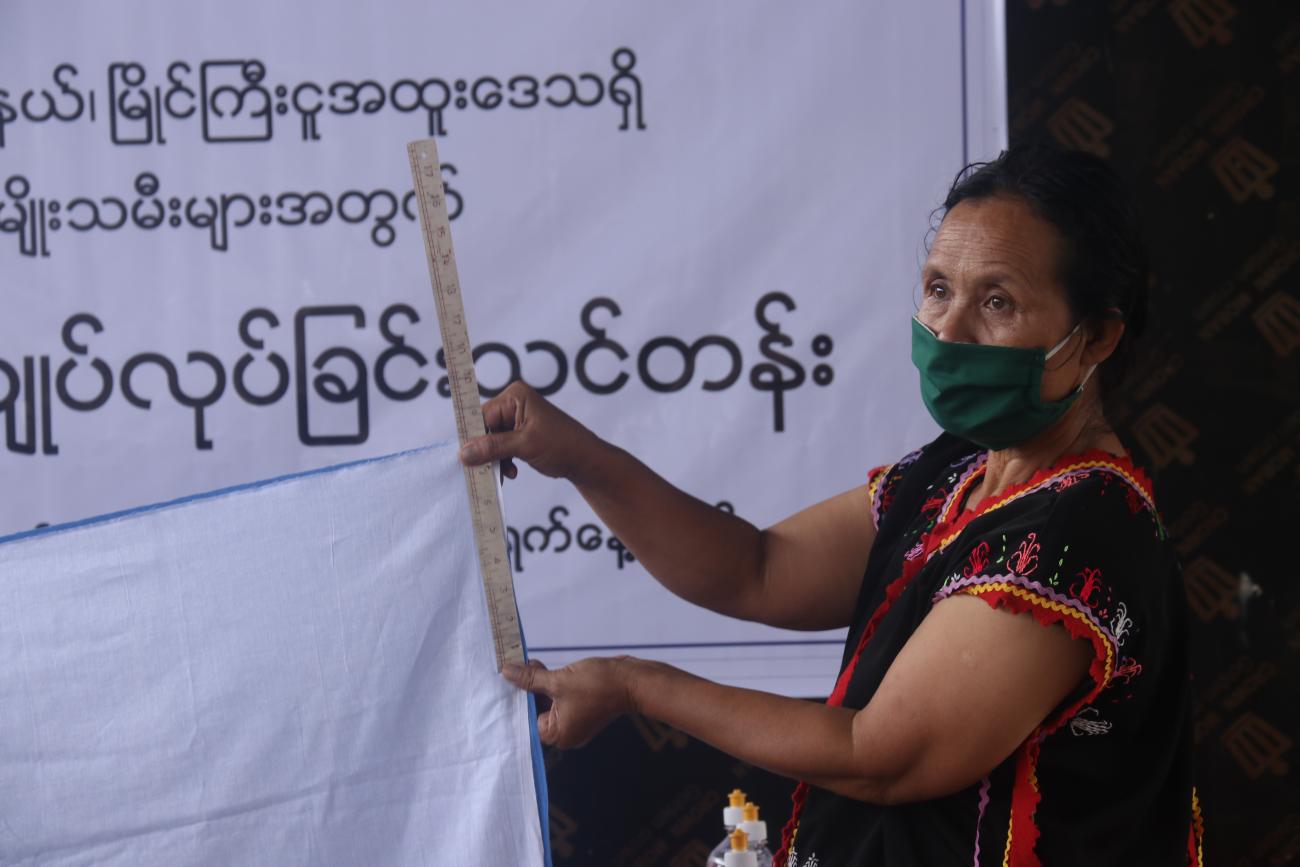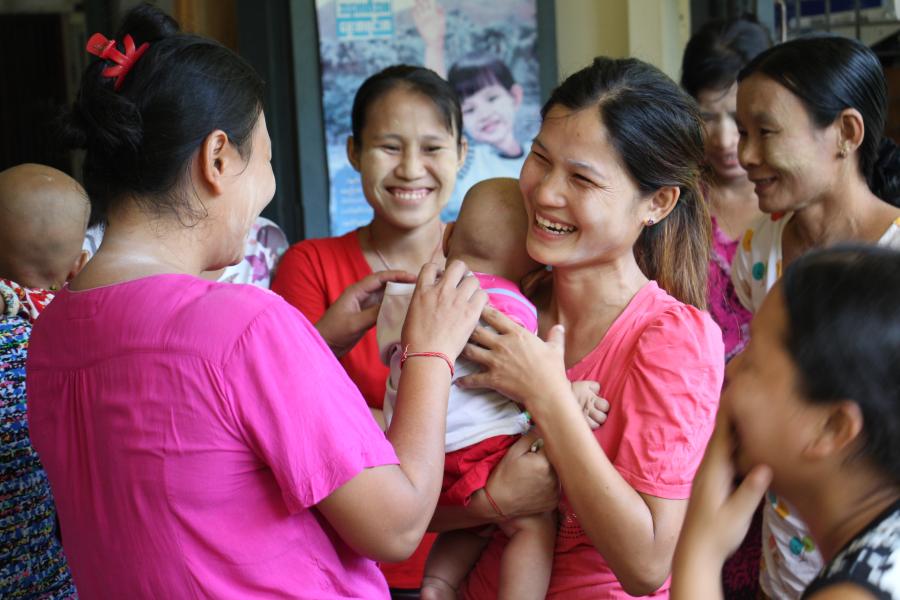Women can help Myanmar emerge stronger from COVID-19 if they are given a chance

Joint Op-ED by the Representatives of UNFPA and UN Women in Myanmar, co-chairs of the United Nations Country Team Gender Theme Group, on the occasion of Myanmar
On behalf of the United Nations in Myanmar and on the occasion of National Women’s Day, we would like to present our greetings to the women and girls of Myanmar and pay tribute to all women for their contribution to the national response to COVID-19 crisis.
In the past few months, COVID-19 has changed the world and affected us all. However, the impact of the crisis has been particularly significant for women. This is true globally and this is true here in Myanmar.
Nearly 60 per cent of women globally work in the informal economy, earning less and at greater risk of falling into poverty. As markets fall and businesses close, millions of women’s jobs have disappeared.
In Myanmar, women represent 60 per cent of the employee engaged in the food and accommodation services and over 90 per cent of garment workers, two sectors which have been particularly hit by the crisis. Close to 800,000 Myanmar women migrant workers are working overseas and particularly vulnerable in the current context.
We all know that in normal circumstances, when schools and daycares are open, women already bear the brunt of unpaid care work due to discriminatory social norms which make people think that care work, cooking, cleaning, child rearing is a woman’s work. Unpaid care work limits women’s ability to participate in the economy as well as in other public spheres including political and peace-building processes.
The COVID-19 crisis has made this worse! Currently, more than 700 million children are out of school in the Asia Pacific region due to school closures. This has forced families to find alternative solutions. And it is no surprise that the additional burden of childcare and home schooling has fallen on women, most of the time with little to no help from male family members. In Myanmar evidence is starting to emerge that one of the reasons that women small and medium entrepreneurs have been more affected by the crisis is because they have had no choice but to abandon their businesses in order to care for their children during these times.
Women and girls are also at greater risk of experiencing gender-based violence when movement is restricted, livelihoods disrupted and access to services and protection systems limited.
Across the region, China, Indonesia, Malaysia, Singapore, and India for instance have all reported significant increases in cases of domestic violence in recent months. While there is no comprehensive data for Myanmar yet, early reports coming from some civil society organizations specializing in services for survivors of violence are in line with this trend.
The COVID19 pandemic, globally and in Myanmar, also poses the risk of restricted access to sexual and reproductive health services for women and girls. From the access to modern methods for family planning, to adequate services for birth delivery, the disruption of services in many places or the fear of accessing services by women and girls risk the regression of precious gains achieved in Child and Maternal mortality reduction and in exercising individual Sexual and Reproductive Health rights.
We know from global evidence that with conflict and increased militarization, populations face heightened risks including that of sexual violence. Continued clashes in Rakhine and Chin States, and the intensification in Rathedaung in recent days, are therefore all the more concerning and Conflicts weaken the ability of the institutions and individuals, particularly women and children in responding to and recovering from COVID-19 and contribute to new humanitarian needs, putting additional pressures on women and girls and social systems. This diverts resources from the collective efforts needed to prevent the spread of COVID-19 which is why both the Secretary General and the Security Council of the United Nations have called for a global humanitarian ceasefire.
If the COVID-19 crisis has particularly affected women, it has however also highlighted once more women’s leadership and the essential contribution of women to society, both globally and here in Myanmar.
In the health sector, we have seen women in laboratories, hospitals, clinics, community health centers and quarantine centers on the frontline of the fight against the virus. In Myanmar, women represent more than 75% of Myanmar health workers and first responders. Women like Daw Hnin Yi Win, a Senior Midwife from Yangon who in addition to assisting deliveries, and providing ante-natal and post-natal care, participates in community outreach efforts to educate pregnant women on how to protect themselves and their families from the virus.
At the height of lockdown measures, we have seen in all countries women restocking the aisles of supermarkets and managing cash registers in full protective equipment, and women market vendors re-organizing wet markets to ensure social distancing and allowing us all to have continued access to food and essential commodities.
Everywhere, we have also seen women leaders, women civil society organization and women’s groups organize adapt and scale up their work to support their communities.
Women like Naw Bway Pa Soe Phaw a trainer with Thandaunggyi Women Group, an organization championing women’s leadership and inclusion in Kayin which initiated a 10-day mask making training course in the Myine Gyi Ngu Internally displaced persons camp in partnership with the Department of Social Welfare to support the State’s Cloth Mask Campaign.
And across the world, we have seen women entrepreneurs adapting and finding new ways to support their families.
Women like Myint from Rakhine state who, when going to the local market was not an option anymore, taught herself the basics of digital marketing with the help of a friend in order to shift to online platforms to sell the multipurpose cloth bags that she produces at home.
Myanmar National Women’s Day provides an important platform to recognize the specific needs of Myanmar women in the COVID-19 crisis, celebrate their leadership and contribution to the response and to commit to placing women at the center of the national recovery efforts, including the Country Economic Relief Plan.
Pursuing a gender-responsive recovery that supports women is not only the right thing to do but it is also the smart thing to do.
Including women in the economic response to COVID-19 can indeed drive a more inclusive and faster recovery. There is strong evidence that during normal circumstances gender equality can drive economic growth and improve business performance. It is estimated for instance that if gender equality was attained in the Asia-Pacific region, if women had the same access to means of production and resources, if care work was equally shared, if women were protected from violence and if women and men were paid equally for equal work, up to 3.2 Trillion dollars would be added to the economy of Asia Pacific countries.
Since the beginning of the crisis, the United Nations in Myanmar has put women at the center of its own efforts to support the national response, including by supporting the continued provision of sexual and reproductive health services, supporting efforts to prevent and respond to gender based violence, supporting women’s economic empowerment and entrepreneurship, supporting cash transfers for women and children, and supporting women’s voice and leadership at all levels.
We have recommitted to this specific focus through our recently released Socio-Economic Response Framework.
Now more than ever, it is essential that both governments and private sector around the world leverage every possible entry point to include women in the recovery when developing their COVID-19 response plans. This will ensure that women are not further left behind, but instead contribute to accelerating economic recovery and lessen the negative impacts in the workplace, marketplace and community.
We look forward to continuing to support the efforts of the government of Myanmar and all national stakeholders in this respect.




